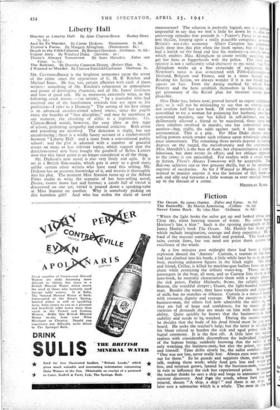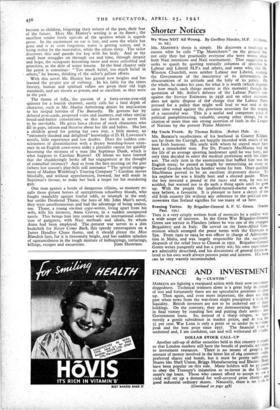Fiction
"WHEN the light broke the sailor got up and looked about If Clear sky, silent heaving masses of water. No other boat Horizon's line,, a blur." Such is the opening paragraph of A James Hanley's book The Ocean. Mr. Hanley has many which include imagination,' courage and deep experience. He fond of the staccato sentence, brief and pointed. The book co tains certain flaws, but one, need not point them against th excellence of the -whole. _ At a few minutes past midnight there had been a viole explosion Aboard the 'Aurora.' Curtain a seaman in the line had just climbed into his bunk; a little while later he is in an op boat, receiving unknown figures in the black night. His ma and friend, Crilley, is killed by machine-gun bullets from an act plane while protecting the solitary water-keg. There are fo passengers in the boat, all men, and as Curtain lists them In h note-book, he mentally characterises them with a single Phrase the sick priest, Father Michaels; -Stone, the reliable teache Benton, the youthful sleeper ; Gaunt, the light-headed businc man. Besides the, water, they have, some. biscuits and three of milk; but no matches or tobacco. Curtain is a natural leak with resource, dignity and courage. With the exception of di business-man the others feel how admirable the sailor is, an they are full of hope and confidence; for he meets all th varieties of demands that are made on him with strength a' ability. Quite quickly he knows that the business-man la stability and needs to be, watched. During the second evellla he decides that the body of his dead friend must be put ove board. He seeks the teacher's help; but the latter is shocked b his blunt refusal to burden the sick and aged priest with burial ceremony. It is the first rift. A little later the teach realises with considerable discomfiture the individual lonelin of the human being; suddenly knowing that the sailor is only watching the business-man,' but also the priest, the you and himself. Time drifts slowly by, the sailor comforts them "One was not lost, never really lost. Always eyes were watch. out for them." So he guards and suppOrts them, making th talk, making them work; while food gets less and water less, and mistrust grows, fanned by the business-man, who in vain to influence the sick but experienced priest. Some the teacher thinks he sees a ship and longs to announce his existent discovery. And digit the youth, whose foot has injured, shouts "A ship, a ship r" and there is no ship. later sees a submarine which is a whale. The, men in the
become as children, forgettipg their misery of the past, their fear of the future. Here Mr. Hanley's writing is at its finest ; the excellent tender lively episode of the sportive whale is superb prose. In the excitement an oar is lost, and soon the whale has gone and is as soon forgotten; water is getting scarce, and is being stolen by the materialist, while the others sleep. The sailor discovers this and guards the keg with his body. And so the small boat struggles on through sea and time, through despair and hope, the occupants becoming more and more enfeebled and primitive, as the dole of water lessens. In the final chapter only the priest is conscious : "Too much belief, too much belief in others," he knows, thinking of the sailor's gallant efforts.
With this novel Mr. Hanley has gained new heights and has learned the proper use of violence. In his fable for the times literary, human and spiritual varues are given their old high standards, and are shown as potent, and as excellent, as they were in the past.
The theme of folly, the passion of a forty-seven-year-old spinster for a loutish charmer, surely calls for a fatal depth of character, such as Mr. Martin Armstrong denies by implication to his insipid heroine of The Butterfly. He governs her by delayed post-cards, proposed visits and journeys, and other similar bread-and-butter conventions, so that her doom is never felt to be inevitable. He gives her—a chorus of stock characters who fill in gaps, inform and theorise about her life and habits. She has a childish greed for getting her own way, a little money, an "extremely shocked and delighted" knowledge of D. H. Lawrence's novels, little experience and few doubts. Does the sudden con- sciousness of dissatisfaction with a dreary boarding-house exist- ence in an English coast-town make a plausible excuse for quickly becoming the mistress of a man like Septimus Dunk, which is what happens to Caroline Bepton? Of whom we have learned that she shudderingly broke off her engagement at the thought of connubial intimacy? And so from the first meeting on the pier (where last season's play-bills still announce "The special engage- ment of Madam Wimbling's Touring Company ") Caroline moves blissfully, and without apprehension, forward, her will made in Septimus's favour, to make her back a target for his murdering gun.
One man against a horde of dangerous villains, so memory re- calls those distant heroes of surreptitious schoolboy bloods, who fought staunchly against fearful odds, to triumph in the end; but unlike Desmond Thane, the hero of Mr. John Mair's novel, they were unselfconscious and had the advantage of being sexless, too. Thane, a young six-foot copy-writer, living apart from his wife, kills his mistress, Anna Craven, in a sudden unexpected tussle. This brings him into contact with an international collec- tion of gangsters, with Nazi methods and ideals, by whom Anna had been employed. The present war serves as a dim backcloth for Never Come Back, this speedy extravaganza on a James Handler Chase theme, and it should please the Miss Blandish fans, for it is tiresomely bright, and has sudden splashes of squeamishness in the tough mixture of kidnappings, torturings, killings, escapes and excursions. JOHN HAMPSON.



























 Previous page
Previous page